below explains, everything from education to land is segregated. Arabs get the left overs. Israel is a state where a plurality of its Jewish
population (48%) want Israeli Arabs to be expelled. Nearly
half of Jewish Israelis want to expel Arabs, survey shows, Times of Israel 8.3.16.
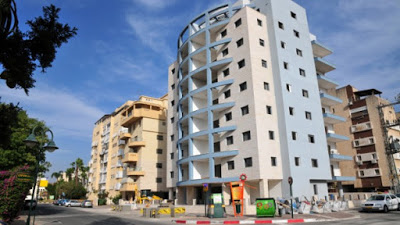 |
| Jewish Afula – Potential Arab residents are called ‘terrorists’ |
segregated. Of course the beauty of Israel is that this is not official, not law, but a matter of custom and administrative practice. Discrimination in Israel is indirect normally rather than direct. By this I mean that an apparently neutral practice or criterion is applied to both Arabs and Jews, but only Jews of course can meet the criteria.
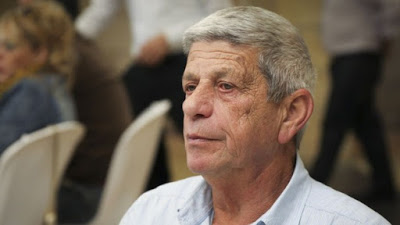 |
| Moti Dotan – Head of Lower Regional Galilee Council |
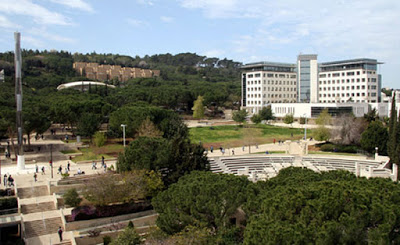 |
| The Technion – Israel’s oldest university – allows Jewish students the right not to share with Arabs |
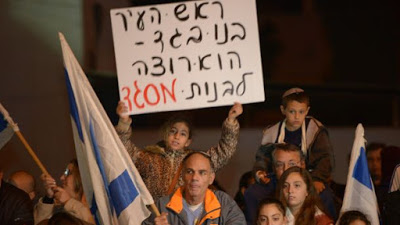 |
| Jewish residents in Afula demonstrating against Arabs living in Afula |
it is the practice of The Technion, Israel’s oldest University, to offer Jewish
students the choice of not having to live with Arabs. Universities are the only sector of education
where Arabs and Jews mix which is why steps are taken to enable Jewish students
not to have to live with Arabs. Arab
and Jewish students live in separate housing at the Technion. As the article notes:
‘They
study together, but they live separately. Students at the Technion – Israel
Institute of Technology share classes and lecture halls with students from many
different religions and backgrounds. But, in the dorms the students can request
to have only a Jewish roommate if they’d like. “We’re trying to avoid
unnecessary friction,” claims those responsible. The Student Union’s former
chairman explains, “It’s natural to want a familiar cultural atmosphere.”
build 49 houses in largely Jewish Afula,
‘a
group of about 200 Afula residents staged a protest, calling on Mayor Yitzhak
Meron to revoke the tenders. Demonstrators denounced him as a “traitor” and a
“terrorist,” according to press reports. “He wants to build a mosque,” one sign
at the protest read.’
cancelled by an Israeli court on some legal pretext. Israel’s
Virulent Housing Bias Runs Deep — and It’s Not Only Aimed at Arabs see also Times of Israel, 24.4.16. Court
revokes Arab-won housing tenders in Afula and State Backs Israeli
Arab Homebuyers in Afula, After Contentious Debate
case because alleged collaboration
between Arab bidders damaged equality!
The fact that Jewish residents were opposed to Arabs, whom they classed as ‘terrorists’ for wanting to live in a Jewish town was of no concern to the Israeli court.
all of these examples of Jim Crow racism and segregation. It’s not biological, it’s not racial, god
forbid. It’s cultural – Arabs aren’t at
our cultural level and therefore it’s only reasonable that ‘we’ (Israeli Jews)
don’t have to share facilities with them.
cultural racism. Indeed cultural
justifications (‘they are not like us’) has been common to all forms of European
fascism. It is one of the justifications
for racial segregation and discrimination from the American Deep South to the
National Front in France.
Lower
Galilee council head: I don’t want Arabs in our pools
Moti Dotan cites ‘hygiene culture’ as one of
the reasons for keeping Arab bathers out of local swimming facilities
2014. (Hadas Parush/Flash 90)
head of the Lower Galilee Regional Council said Thursday that he does not want
to see Arabs in his local community pools, alleging that they have different
bathing practices and a “hygiene culture” that is “not like ours.”
official, Moti Dotan, whose council in the north of the country comprises 18
regional Jewish and agricultural communities in an area dotted with Arab
villages, made the comments during a live interview with Radio Kol Chai.
station had previously sent a questionnaire to northern council leaders about
whether or not they would let non-locals use their swimming pools. Dotan’s
written response prompted the station to speak to him directly for further
clarification.
show leadership and not popularity on social media. I mean every word. To
maintain pools costs a lot of money,” Dotan said. “Therefore, I think that those who are not from the community and the
area should pay more.
pools. I don’t go to their pools either. If I went there in a [scanty]
swimsuit, or took girls in bikinis with me, it’s clear to you what would happen
to them… Therefore [the Arabs] should stay in their pools and [we] should stay
in ours.”
religious and tradition Arab women remain clothed or fully covered when bathing
in public places.
with their clothes on, and try to lay down manners of dress like that or
similar, and therefore it is not suitable for us. The hygiene culture is not
like ours. Why is it racism?”
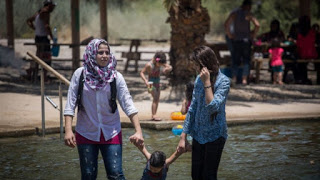 |
| Illustrative photo of Arab women at an outdoor bathing pool in Israel, July 19, 2015. (Hadas Parush/Flash90) |
over his blanket description of Arab bathers by the radio show host, who
posited that not all Arabs eschew bikinis or hygiene, Dotan replied that if so,
they can go ahead and build their own swimming pools.
there are bikinis, I will be happy to come and join them in their pools,” he
said.
mayor then said that he has nothing against non-local bathers in the community
pools, including Arabs, as long as they fit in with the local residents.
the way, also Arabs — if they behave according to the norms that we have, then
I have no problem with them, but that doesn’t happen.”
noted that an Arab-operated pool near Kibbutz Beit Rimon in the Galilee region
doesn’t have any Jewish patrons.
isn’t racism. The day that Jewish men and women can feel comfortable in an Arab
community I will be happy to receive them by me as well. Until that happens I
don’t want them.”
the son of two Holocaust survivors who came to Israel in 1948, and whose
grandfather also survived the Nazi death camps, insisted that he has “very good
relations with the Arabs in the area, they know my views” and claimed many of
them respect him for being so forthright.
Youssef Jabareen, of the Joint (Arab) List parliamentary faction, called on
Attorney General Avichai Mandelblit to look into Dotan’s publicly declared
attitudes and demanded the council chief’s immediate resignation.
in our pools
reasons for keeping Arab bathers out of local swimming facilities
Miller and Stuart Winer July 28, 2016, 5:51 pm
Mayor Who Doesn’t Want Arabs in His Pools Is No Extremist – He’s in the
Mainstream
race culture that brought about Moti Dotan’s statement is fed by a leadership
that has made the exclusion and isolation of this country’s Arab citizens the
backbone of Israeli patriotism.
31, 2016 1:57 AM
hate Arabs, but I don’t want them at my swimming pools,” Lower Galilee council
chief Moti Dotan was expressing the essence of that deep-rooted form of racism
– the kind that doesn’t masquerade as something else or cloak itself in
political correctness.
an Israeli radio station on Thursday, Dotan didn’t call for Arabs to be
expelled from the country or for the torching of their village mosques. He’s
not a member of the La Familia group of Beitar Jerusalem soccer fans and
wouldn’t shout “Death to the Arabs!”. The Lower Galilee council head is
actually expressing what many Jews – if not a majority of the Jewish population
in Israel – think. “In non-Jewish, Arab culture, you go into the pool wearing
clothes, trying to dictate all types of clothing, and that’s why it doesn’t
suit us. The culture of cleanliness isn’t the same as ours,” he declared, and
in the same breath stressed that he has Arab friends.
racism, Dotan’s position can be added to those of the nightclub bouncers who
refuse entry to Israelis of Ethiopian origin or anyone whose culture “isn’t
characterized by my culture at places of leisure such as a swimming pool,” as
Dotan put it. He later retracted his choice of words in the way that’s accepted
today when it comes to racist slips of the tongue: “It’s possible that I was
misunderstood.”
“his” culture that has nurtured this ignorant racism for years and maintains
the relations of enmity with the Arab minority, as part of what shapes the
national cultural identity of society in Israel. This race culture is fed by a
leadership that has made the exclusion and isolation of the country’s Arab
citizens the backbone of Israeli patriotism. It’s the same leadership that
excludes the late Palestinian poet Mahmoud Darwish from the schools curriculum
and public discourse; that is afraid of the term “Nakba”; that harasses Arab and
Jewish theaters that dare highlight the Palestinian narrative; and that tries
to destroy the status of the Arabic language in the country. It also allows
Moti Dotan, even if not formally, to establish his own “cultural” rules to rid
swimming pools in the Lower Galilee Regional Council of the presence of Arabs.
Knesset members to Interior Minister Arye Dery and Attorney General Avichai
Mendelblit seeking to have them examine whether this constitutes incitement are
correct, but they’re not enough. If Prime Minister Benjamin Netanyahu is truly
serious about his intention to change how he relates to Israel’s Arab citizens
– as he declared in his video address to them last week (“Thrive in droves”) –
it is appropriate that his voice be heard on the subject and that he make clear
that Arabs are wanted everywhere in the country, just like the rest of Israel’s
citizens.
Palestinians
inside Israel are under attack
Was it meant as an epic parody or an insult to his audience’s intelligence?
It was hard to tell.
Israeli prime minister Benjamin Netanyahu took to social media to apologise
for last year’s notorious election-day comment, when he warned that “the Arabs
are coming out to vote in droves” – a reference to the fifth of Israel’s
population who are Palestinian.
In videos released last week in English and Hebrew, Mr Netanyahu urged
Palestinian citizens to become more active in public life. They needed to “work
in droves, study in droves, thrive in droves,” he said. “I am proud of the role
Arabs play in Israel’s success”.
Pointedly, Ayman Odeh, head of the Palestinian-dominated Joint List party,
noted that 100,000 Bedouin citizens could not watch the video because Israel
denies their communities electricity, internet connections and all other
services.
Swiftly and predictably, the reality of life for Israel’s 1.7 million
Palestinians upstaged Mr Netanyahu’s fine words. In a radio interview, Moti
Dotan, the head of the Lower Galilee regional council, sent a message to his
Palestinian neighbours: “I don’t want them at my [swimming] pools.” Sounding
like a mayor in the southern United States during the Jim Crow-era, he added:
“Their culture of cleanliness isn’t the same as ours. Why is that racist?”
Dotan was no extremist, observed the liberal newspaper Haaretz. He
represents the Israeli mainstream. Notably, Mr Netanyahu did not distance
himself from Mr Dotan’s remarks.
At the same time, Samar Qupty, star of a new film on Palestinians in Israel
called Junction 48, was questioned for two hours and then strip searched at Ben
Gurion airport and denied her hand luggage before being allowed to fly to an
international film festival.
Stories of state-sponsored humiliation at the airport are routine for
Israel’s Palestinian academics, journalists, actors and community leaders – in
fact, for any Palestinian active in the public sphere.
The list of restrictions on Palestinian citizens is long and growing. A
database by the legal group Adalah shows that some 60 Israeli laws explicitly
discriminate against non-Jews, with another 18 in the pipeline.
Two laws passed last month intensify the repression of dissent. An Expulsion
Law is designed to empower Israeli MPs to oust Palestinian lawmakers whose
views offend them, while a Transparency Law stigmatises human rights groups
working to protect Palestinian rights.
Recently leaked protocols reveal that the police have secretly awarded
themselves powers to use live fire against Palestinian protesters in Israel,
even if they pose no danger. Yet another law threatens jail for any Palestinian
citizen who tries to dissuade another from volunteering in the Israeli army.
Growing numbers of Palestinian citizens, including poets and writers, are
being jailed or put under house arrest for posts on social media the Israeli
authorities disapprove of.
Defence minister Avigdor Lieberman recently compared the work of the
Palestinians’ national poet, Mahmoud Darwish, to Hitler’s Mein Kampf. Darwish
is banned from school curriculums.
The culture minister, Miri Regev, meanwhile, has tied state funding for
theatre and dance companies to their readiness to perform in Jewish
settlements, illegally located in the occupied territories in the West Bank.
In his video, Mr Netanyahu said: “Jews and Arabs should reach out to each
other, get to know each other’s families. Listen to each other.”
And yet his officials have just halved funding for the training of
Palestinian student teachers, though not Jewish ones, to deter the former from
pursuing teaching careers. Jewish schools face severe staff shortages, but
Israel’s educational segregation is so complete that Palestinian citizens
cannot be allowed to teach Jewish children.
Mr Netanyahu also extolled his government for a promise to increase funding
for Israel’s near-bankrupt Palestinian local authorities. He forgot to mention,
however, that he had conditioned the money on the same councils demolishing
thousands of homes in their jurisdiction. For decades Palestinians in Israel
have been routinely denied building permits.
Israel’s Palestinian citizens were not fooled by Mr Netanyahu’s video. But
as their leaders noted, they were not the intended audience. The video was a
cynical PR exercise aimed firmly at the Europeans, who have been discomfited by
Israel’s increasingly repressive climate and the government’s regular
incitement against its Palestinian minority.
Mr Netanyahu is worried about a backlash in the West, including growing
support for the boycott movement, European efforts to revive peace talks, and
potential moves at the United Nations and International Criminal Court.
Palestinians in Israel have known worse repression than they currently
endure. For Israel’s first two decades they lived under military rule, locked
into their towns and villages and largely invisible unless they agreed to do
and say as they were told. Palestinian MPs could be elected to the parliament
but only if they were first approved by Zionist parties like Mr Netanyahu’s.
The Israeli right sounds ever more nostalgic for that era. Slowly the ethos
of the military government for Israel’s Palestinians is returning – and the
perfume of Mr Netanyahu’s soothing words about ending “discord and hate” will
not cover the stench.
